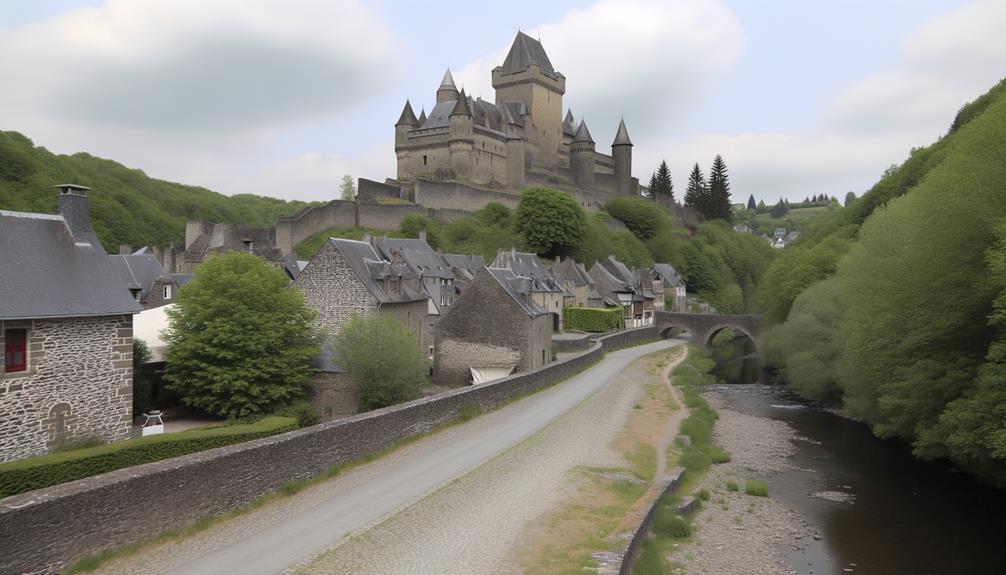Meaning of the Name Warwick
The name Warwick originates from Old English, combining 'wering,' meaning weir or dam, and 'wic,' meaning settlement. Initially descriptive of its geographical features, Warwick evolved into a fortified settlement with significant historical importance, especially during the Middle Ages and the Wars of the Roses.
The name is associated with a rich cultural heritage, marked by medieval architecture such as Warwick Castle and numerous contemporary cultural festivals. Renowned namesakes include Richard Neville, the 'Kingmaker,' and actor Warwick Davis.
Today, the name continues to embody heritage and prestige. Explore further to uncover deeper insights into Warwick's enduring legacy.

Key Takeaways
- The name Warwick originates from Old English, combining 'wering' (weir or dam) and 'wic' (settlement or dwelling).
- It reflects the town's early geographical features and functional characteristics as a fortified settlement.
- Warwick has historical significance due to its strategic location and role in the Wars of the Roses.
- The name is associated with heritage, prestige, and rich cultural traditions, including Warwick Castle.
- Modern usage of Warwick is influenced by public figures like actor Warwick Davis, enhancing its contemporary appeal.
Etymology of Warwick
The etymology of Warwick can be traced back to Old English origins, specifically deriving from the compound words 'wering' (meaning weir or dam) and 'wic' (meaning settlement or dwelling). This nomenclature reflects the town's geographical and functional characteristics during its early establishment.
The term 'wering' indicates the presence of a riverine structure, likely used for managing water flow or fishing activities, which was essential for the sustenance and economic activities of its inhabitants. Coupled with 'wic,' it signifies a place where people lived and worked, emphasizing the settlement's role as a structured community.
This linguistic composition highlights the interplay between natural resources and human habitation, central to understanding the developmental history of Warwick's name.
Historical Significance
Rooted in its strategic location and evolving role throughout centuries, Warwick's historical importance is multifaceted, encompassing its emergence as a fortified settlement, its economic development, and its influence in regional politics.
Initially established as a defensive stronghold during the Saxon era, Warwick's castle became a pivotal fortification during the Norman conquest and subsequent medieval conflicts.
The town's prosperity soared in the Middle Ages, bolstered by its thriving wool trade, which positioned Warwick as an economic hub in the Midlands.
Politically, Warwick played a vital role, especially during the Wars of the Roses, where the Earls of Warwick were influential figures.
This rich historical tapestry underscores Warwick's enduring legacy in England's socio-political and economic evolution.
Cultural Impact
Warwick's cultural impact is profound, reflected in its rich architectural heritage, vibrant arts scene, and enduring traditions that have shaped the town's identity over centuries. The town's medieval structures, such as Warwick Castle, serve as tangible links to a storied past, while contemporary festivals and events invigorate its cultural life. The table below outlines some key cultural aspects that contribute to Warwick's unique character:
| Aspect | Historical Influence | Modern Significance |
|---|---|---|
| Architecture | Medieval castles and churches | Tourist attractions and heritage sites |
| Arts | Traditional folk music and theater | Annual arts festivals and local galleries |
| Festivals | Historical reenactments | Warwick Folk Festival, Food & Drink Festival |
| Education | Historic schools and libraries | University town with diverse student body |
| Community Traditions | Long-standing local customs and ceremonies | Community events and local markets |
These elements collectively underscore Warwick's lasting cultural resonance.
Famous Namesakes
Numerous individuals bearing the name Warwick have left indelible marks across various fields, from medieval history to contemporary arts and politics.
Richard Neville, the 16th Earl of Warwick, famously known as the 'Kingmaker,' played a pivotal role during the Wars of the Roses, influencing the English throne's succession in the 15th century.
In the arts, Warwick Davis, an acclaimed actor, has made significant contributions to film and television, particularly in the 'Star Wars' and 'Harry Potter' franchises.
In politics, Warwick Smith, an Australian public servant and politician, has had a prominent career advocating for regional development.
These figures, among others, underscore the name's historical and contemporary resonance, highlighting the diverse areas where Warwicks have achieved prominence.
Modern Usage
In contemporary society, the name Warwick continues to be embraced across various cultures and regions, reflecting both its historical significance and evolving modern appeal. This name, rooted in Anglo-Saxon heritage, has found relevance in several modern contexts:
- Cultural Resurgence: Warwick is often chosen for its classic, yet distinguished sound, making it popular among parents seeking traditional names.
- Geographical Significance: The name is synonymous with Warwickshire, a historic county in England, enhancing its association with heritage and prestige.
- Media and Entertainment: Notable figures like Warwick Davis, a prominent actor, have brought the name into contemporary popular culture, further solidifying its modern relevance.
Thus, Warwick maintains a unique position, merging historical roots with modern-day significance.
Conclusion
Coincidentally, the name Warwick, with its Old English roots signifying 'dwellings by the weir,' intersects with multiple historical and cultural touchpoints.
Its etymology reveals the deep-seated connection to early settlement patterns, while its historical significance is underscored by notable figures and events.
The cultural impact of the name Warwick is evident through its persistent presence in literature and media.
Modern usage continues to reflect its storied past, demonstrating an enduring legacy that transcends time and geography.






